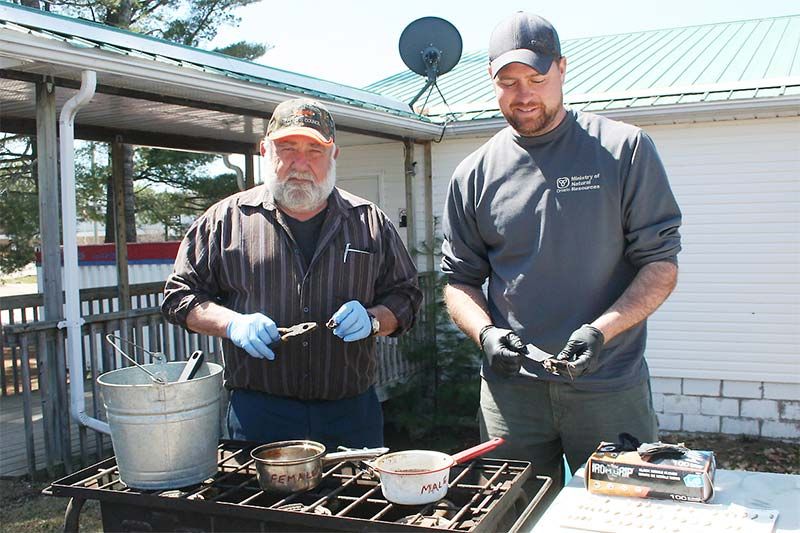Craig Bakay | Apr 27, 2017
To the uninitiated, the words ‘fisher tooth boil’ may invoke thoughts of a group meal featuring an exotic soup made using a traditional Canadian recipe.
But in actual fact, you really wouldn’t want a bowl of this.
You see, boiling fisher heads is just a convenient way of loosening the canine teeth, which are then analyzed to determine the age of the animal they came from and ultimately, the health of the population in a given area.
The fisher, a mid-size member of the weasel family is a valuable fur-bearer that fetched an average overall price of about $40 at the NAFA’s April 2016 sale. Compare that to the average price of about $10 for beaver and about $2.50 for muskrat and you can see why trappers might want to harvest them.
In conjunction with the Ministry of Natural Resources and Forests, trappers associations have been collecting the canines and cataloguing them. The Frontenac-Addington Trappers Association has been participating in the program for some time now and has held a ‘fisher tooth boil’ at its annual spring workshop for the past four years. The workshops themselves have been going on in one form or another since the mid-’90s.
“We tell the Ministry if the tooth came from a male or a female,” said president Wilf Deline at the annual Frontenac-Addington Trappers Association Workshop in Cloyne last Sunday. “The Ministry then X-rays the tooth and from the root canal, they can determine whether its an adult or a juvenile.
“The ratio of juveniles to adult females tells you how healthy the population is.
“For example, a ratio of three juveniles to one adult female indicates a healthy population.”
From that ratio, the Ministry will set quotas on how many fishers can be trapped in a defined area.
“Right now, it’s one fisher for every 400 acres,” Deline said. “If they feel the population is in trouble, that will be lowered (but) while the population is lower than it was in the ’80s, it’s been quite stable since then, with a gentle fluctuation.
“It’s actually growing in areas south of Verona.”
Deline said his association is “over 90 per cent compliant” with the tooth program and deciding to incorporate into the workshop has helped.
Deline isn’t concerned about the fisher (or most other fur-bearing animal) populations though. Prices for fur don’t really encourage many to pursue it as a business. For most trappers, it’s about preserving an aspect of our Canadian heritage and perhaps more importantly, being stewards of the land.”
“If the fisher prices got up to $200-$300, then it would be a concern,” he said. “But this hasn’t been about money since the late ’80s.
“It’s about passing on a tradition and the wise use of a renewable resource.
“We’ll tell anyone who’ll listen, and hopefully it helps.”
More Stories
- Global Gardening
- No Winner Yet in Catch The Ace But Fundraising Target Met
- South Frontenac Food Bank Opens Second Location in Battersea
- Sharbot Lake Pentecostal Church Anniversary - 1925-2025
- Frontenac Holistic Health Fair - September 20 At Storrington Centre
- Odd Year For Real Estate - But Sales Are Steady Year Over Year
- 193rd Kingston Fall Fair
- Kim Phuc - the Napalm Girl - To Visit Flinton In November
- South Frontenac Council - September 2
- Sticker Shock - EV Charging Station To Cost North Frontenac Township

